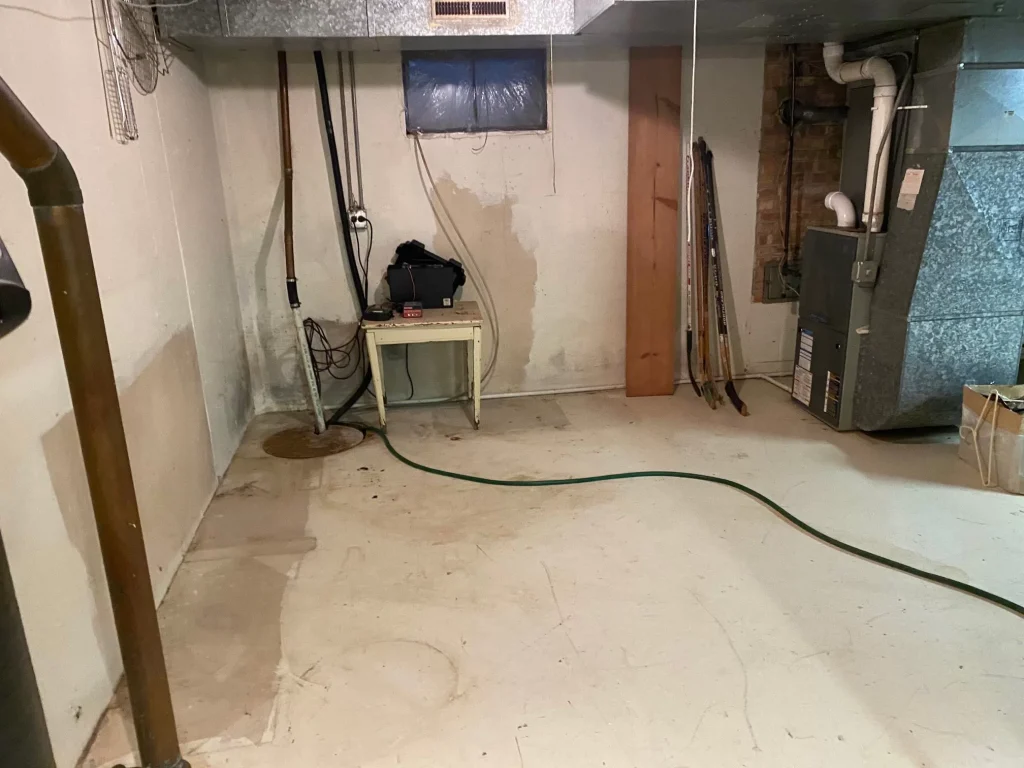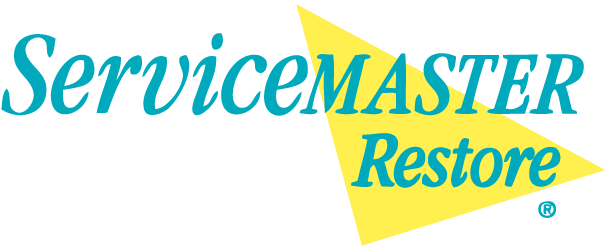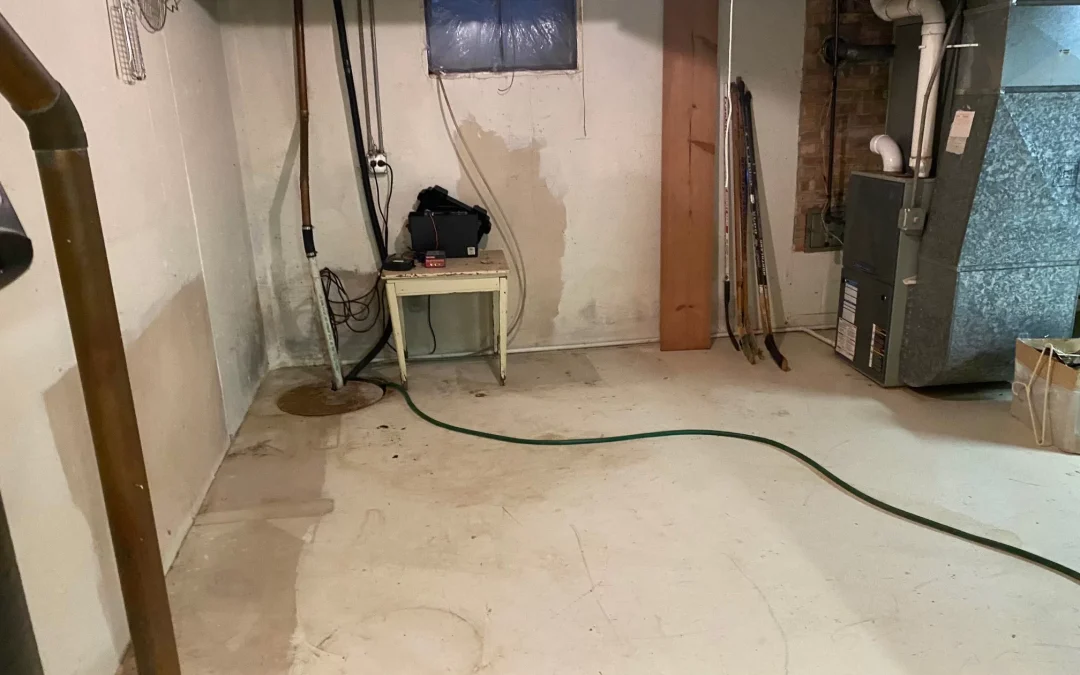Homes in the Chicagoland area face a heightened risk of water damage due to frequent flooding and severe weather conditions. To protect their properties, homeowners are encouraged to adopt effective strategies for prevention. Here’s a closer look at why water damage is a significant concern in this region and practical steps to safeguard your home.
Why are Chicagoland homes at risk for water damage?
1. Aging Infrastructure
Chicagoland’s infrastructure—the network of sewers—is old. The area utilizes a combined sewer system, which allows stormwater and sewage to travel in the same pipes. Designed decades ago, the combined system is no longer capable of optimal performance, leading to water damage during heavy rainfalls.
Due to age, the area’s vast system is overwhelmed by modern rainfall patterns and performs inadequately. This leads to a higher risk of various types of water damage, from flooding to sewage backups, in local residential homes and commercial businesses.
Furthermore, Chicagoland’s aging infrastructure is hampered by urban development. The area has a high percentage of concrete, pavement, and other impervious surfaces. Rainwater has nowhere to go but directly into the sewers, stressing the pipes. Upgrading the system is a massive effort due to its vast size.
2. Temperature Fluctuations
Chicagoland’s severe weather is well-known. The extreme fluctuations in temperature between seasons are major contributors to home flooding. Localized flooding occurs throughout the year as summer unleashes a series of torrential storms and early spring produces snowmelt and heavy rains.
3. Proximity to Lake Michigan
Precipitation, evaporation, and runoff contribute to Lake Michigan’s fluctuating water levels. These fluctuations are exacerbated due to the effects of climate change. Near record-high water levels have been recorded in recent years. Low-lying areas are consequently at risk for flooding.

How do homeowners protect their homes?
Chicagoland homeowners are advised to be aware of the potential for severe flooding due to the aforementioned risk factors. The home’s basement and garage can become flooded and undergo sewer backflow issues without a functional sump pump or ejector pump system.
Even when the sump pump or ejectors system is operational, homes can still become flooded. This happens when Chicagoland’s sewers are overwhelmed during the rainy season. Blocked sewer lines and brittle pipes force water into residential drains; excessive water pressure stresses the home’s pipes.
1. Clear Sewer Lines
Homeowners should ensure their home’s sewer lines are free from obstructions. Even when the city’s drains backflow, a well-maintained sewer line reduces the risk of flooding. Schedule regular hydro-jetting or rodding with a plumber to clear up the sewer lines.
Licensed plumbers also work with high-tech camera equipment, which provides visuals of the interiors of the home’s plumbing system. Corrosion, tree roots, clogs, and hidden debris are quickly detected through video inspections and resolved, thereby preventing potential backflows during storms.
2. Maintain the Sump Pump
A functional sump pump or ejector pump system is a home’s number one defense against basement flooding during Chicagoland’s rainy season. Despite operational differences, these two devices achieve the same goal: transport floodwater from the basement into the local municipality’s drainage system.
Test the pump regularly, especially before the heavy rain, and clean it to remove clogs. Check that the valves work and examine it for any damage. Keep a backup battery on hand in the event the electricity that powers the pump is cut during a storm.
3. Consider an Overhead Sewer Conversion
An overhead sewer conversion is a third way to protect the home from water damage. This type of system raises the home’s sewer line above the level of the basement, which helps prevent backflows from Chicago’s sewer systems. Installing an overhead sewer conversion delivers peace of mind.
However, the cost can be prohibitive to many homeowners. The price ranges from $3,000 to $15,000, depending on the complexity of the home’s plumbing system as well as the location of the property. Fortunately, many cities offer cost-sharing programs to offset the expense for homeowners.
4. Seal Foundation Cracks
Fierce storms can force rainwater through existing cracks in the home’s foundation. It’s critical to routinely examine the foundation, looking for cracks that allow water seepage. Perform professional inspections at least once annually and more frequently if the home is older.
Signs of foundation problems include cracks in the walls, ceilings, and around windows. Cracks may also appear on brickwork and extend through chimneys. When cracks are discovered, seal them with caulk to prevent water intrusions during the height of summer storms.
Even well-maintained homes in Chicagoland are at risk for water damage due to extreme weather conditions. Homeowners must take precautions by learning the risks and the appropriate steps to mitigate them. It’s also critical to know of a reputable water damage restoration company.
Professional Water Damage Restoration Throughout Chicagoland
When flooding occurs, it causes major water damage. The home’s wooden components warp and rot, leading to severe structural damage that compromises the safety of the occupants. Water damage of any extent warrants immediate attention from the professionals at ServiceMaster S&R Systems.
We provide high-quality water damage restoration services that return your water-damaged property to its original condition. Our IICRC certified technicians arrive at your home promptly and assess the degree of water damage. We formulate a customized water mitigation plan and begin work right away.
Using advanced water extraction equipment and industry-led techniques, our specialists remove standing water from the home. We then place powerful air dryers and dehumidifiers throughout the affected spaces to eliminate all traces of excess moisture from furnishings and building materials.
If mold infestations have developed as a result of a flooded basement, our experts eliminate the colonies. Damaged areas are cleaned and repaired. As a further convenience, our water mitigation pros help homeowners with insurance claims. Our services are available 24 hours a day, 7 days a week.
When you face water damage in your Chicagoland home, don’t delay calling ServiceMaster S&R Systems for immediate water damage restoration. We are proud to serve Naperville, Illinois, and the surrounding areas.

